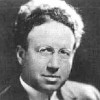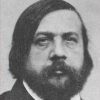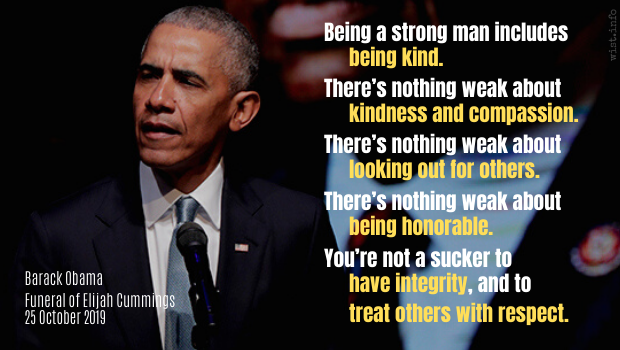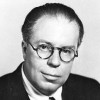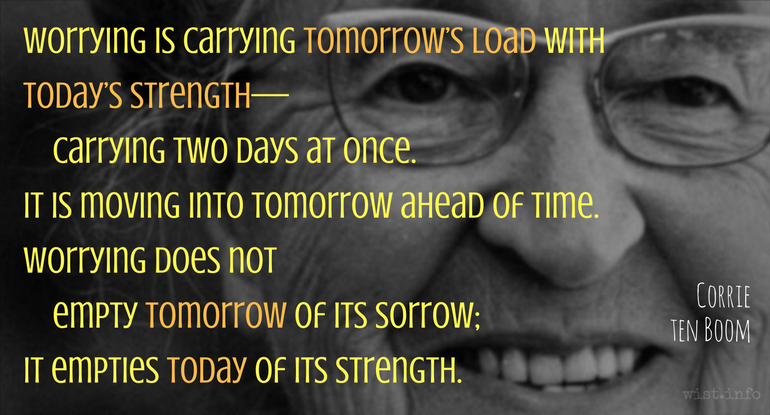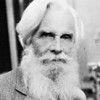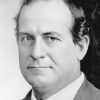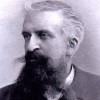He was not a strong-minded man; but he had one quality which is almost as valuable a safeguard against temptation as strength of mind — namely, timidity.
F. Anstey (1856-1934) English novelist and journalist (pseud. of Thomas Anstey Guthrie)
Tourmalin’s Time Cheques, Prologue (1885)
(Source)
Quotations about:
strength
Note not all quotations have been tagged, so Search may find additional quotes on this topic.
This man through all his new life, fresh and young,
in virtual power was one who might have proved,
in all of his behaviour, wonderful.
Yet there, on earth, the richer soil may be,
the more — untilled or sown with evil seed —
its vigour turns to wilderness and bane.[Questi fu tal ne la sua vita nova
virtüalmente, ch’ogne abito destro
fatto averebbe in lui mirabil prova.
Ma tanto più maligno e più silvestro
si fa ’l terren col mal seme e non cólto,
quant’elli ha più di buon vigor terrestro.]Dante Alighieri (1265-1321) Italian poet
The Divine Comedy [Divina Commedia], Book 2 “Purgatorio,” Canto 30, l. 115ff (3.115-120) [Beatrice] (1314) [tr. Kirkpatrick (2007)]
(Source)
Beatrice, speaking of Dante.
(Source (Italian)). Alternate translations:
Such genuine worth adorn'd his early days,
That each prolific stem of heav'nly Grace
In that rich Mould a genuine footing found:
But, oh! the rankest soil but serves to feed
The plant of juice malign, and noxious weed.
If Culture's hand neglect the hapless ground.
[tr. Boyd (1802), st. 26]
This man
Was in the freshness of his being, such,
So gifted virtually, that in him
All better habits wond’rously had thriv’d.
The more of kindly strength is in the soil,
So much doth evil seed and lack of culture
Mar it the more, and make it run to wildness.
[tr. Cary (1814)]
This man was such, in his new being found,
Of virtuous kind, that every nobler way
In him gave proof of wonderful essay;
So much the more malignant, wild the soil
Of earth with evil seed, untilled with toil,
The more good vigour and terrestrial oil.
[tr. Bannerman (1850)]
Such had this man become in his new life
Potentially, that every righteous habit
Would have made admirable proof in him;
But so much more malignant and more savage
Becomes the land untilled and with bad seed,
The more good earthly vigour it possesses.
[tr. Longfellow (1867)]
This man was such in his new life, potentially, that every right habit would have wrought in him a wondrous result. But all the more malign and the more wild becomes the ground with bad seed and uncultivated, in proportion as it has from the soil more of good force.
[tr. Butler (1885)]
This one was such in new life's opening hour
Fitted for good, that every virtuous growth
Had made in him miraculous proof of power.
But so much more malign and tangled groweth,
With poisonous wilding seeds, the uncultured sward,
As of terrestrial strength the more it show.
[tr. Minchin (1885)]
This man was such in his new life, virtually, that every right habit would have made admirable proof in him. But so much the more malign and more savage becomes the land ill-sown and untilled, as it has more of good terrestrial vigor.
[tr. Norton (1892)]
This man was such in his new life potentially, that every good talent would have made wondrous increase in him.
But so much the more rank and wild the ground becomes with evil seed and untilled, the more it hath of good strength of soil.
[tr. Okey (1901)]
This man in his early life was such potentially that every right disposition would have come to marvelous proof in him; but so much the more noxious and wild the ground becomes, with bad seed and untilled, as it has more good strength of soil.
[tr. Sinclair (1939)]
This man was such in natural potency,
In his new life, that all the ingrained good
Looked in him to have fruited wonderously.
But so much groweth the more rank and rude
The soil with bad seed and unhusbanded,
The more it hath from earth of hardihood.
[tr. Binyon (1943)]
[...] had so endowed this man, potentially,
In his new life, that from such gifts as those
A wondrous harvest would have come to be.
But so much ranker, weedier, and more gross
Runs the untended field where wild tares seed,
As the good soil is rich and vigorous.
[tr. Sayers (1955)]
This man, potentially, was so endowed
from early youth that marvelous increase
should have come from every good he sowed.
But richest soil the soonest will grow wild
with bad seed and neglect.
[tr. Ciardi (1961)]
This man was such in his new life, virtually, that every right disposition would have made marvelous proof in him. But so much the more rank and wild becomes the land, ill-sown and untilled, as it has more of good strength of soil.
[tr. Singleton (1973)]
[...] was this man so endowed, potentially,
in early youth -- had he allowed his gifts
to bloom, he would have reaped abundantly.
But the more vigorous and rich the soil,
the wilder and weedier it grows
when left untilled, its bad seeds flourishing.
[tr. Musa (1981)]
This man, in his youthful years, had such
Possibilities, that every propitious tendency
Would have produced some marvelous result in him.
But ground sown with bad seed and not cultivated
Becomes the more malignant and overgrown
The more wholesome vigour there is in the soil.
[tr. Sisson (1981)]
He
when young, was such -- potentially -- that any
propensity innate in him would have
prodigiously succeeded, had he acted.
But where the soil has finer vigor, there
precisely -- when untilled or badly seeded --
will that terrain grow wilder and more noxious.
[tr. Mandelbaum (1982)]
This man, potentially, was such in his vita nuova, his new life, that every true skill would have grown miraculously in him. But the more good qualities the earth’s soil has, the more wild and coarse it becomes with evil seed, and lack of cultivation.
[tr. Kline (2002)]
He was such in his new life, potentially, that every good habit would have produced a marvelous result in him.
But all the more malignant and wild becomes the soil with bad seed and without cultivation, the more it has in it of good earthly vigor.
[tr. Durling (2003)]
This man in his new life potentially was such
that each good disposition in him
would have come to marvelous conclusion,
but the richer and more vigorous the soil,
when planted ill and left to go to seed,
the wilder and more noxious it becomes.
[tr. Hollander/Hollander (2007)]
And one such was this man's new life on earth,
So all good inclinations, all predictions,
Should wonderfully be proved in the life he lives.
Yet land improperly sown, and never tilled,
But blessed with soil of enormous power and strength,
Will turn itself more terribly rank and foul.
[tr. Raffel (2010)]
I always fear less a dull man who is naturally strong
Than someone who is weak and clever.
[ἀεὶ γὰρ ἄνδρα σκαιὸν ἰσχυρὸν φύσει
ἧσσον δέδοικα τἀσθενοῦς τε καὶ σοφοῦ.]Euripides (485?-406? BC) Greek tragic dramatist
Bellerophon [Βελλεροφῶν], frag. 290 (TGF) (c. 430 BC) [tr. @sentantiq (2015)]
(Source)
Barnes frag. 51, Musgrave frag. 11. (Source (Greek)). Alternate translations:
By far less dangerous I esteem the fool
Endued with strength of body, than the man
Who's feeble and yet wise.
[tr. Wodhull (1809)]
I always fear a stupid if bodily powerful man less than one who is both weak and clever.
[tr. Collard, Hargreaves, Cropp (1995)]
Always I fear an unintelligent but naturally strong man less than a weak and clever one.
[tr. Stevens (2012)]
I fear less the powerful but stupid
than the weak and cunning.
[Source]
I arise today
Through the strength of heaven:
Light of sun,
Brilliance of moon,
Splendor of fire,
Speed of lightning,
Swiftness of wind,
Depth of sea,
Stability of earth,
Firmness of rock.Patrick (fl. AD 5th C) Romano-British Christian missionary, saint, bishop of Ireland
“The Lorica of Patrick” (attributed)
(Source)
An intelligent man is lost if he does not add strength of character to his intelligence.
[Un homme d’esprit est perdu, s’il ne joint pas à l’esprit l’énergie de caractère.]
Nicolas Chamfort (1741-1794) French writer, epigrammist (b. Nicolas-Sébastien Roch)
Products of Perfected Civilization [Produits de la Civilisation Perfectionée], Part 1 “Maxims and Thoughts [Maximes et Pensées],” ch. 4, ¶ 277 (1795) [tr. Mathers (1926)]
(Source)
(Source (French)). Alternate translations:
A person of intellect, without energy added to it, is a failure.
[Source (1893)]
A man of wit is lost, if to his wit he does not join energy of character.
[tr. Hutchinson (1902)]
A man of intelligence is lost if his intelligence is not combined with energy of character.
[tr. Merwin (1969)]
A man of intellect is lost if he does not ally strength of mind to strength of character.
[tr. Pearson (1973)]
Any intelligent man who lacks character is lost.
[tr. Parmée (2003), ¶ 173]
A man with spirit is lost if he doesn't add to his intelligence an energetic character.
[tr. Sinicalchi]
For when the faculty of intellect
is joined with brute force and with evil will,
no man can win against such an alliance.[Ché dove l’argomento de la mente
s’aggiugne al mal volere e a la possa,
nessun riparo vi può far la gente.]Dante Alighieri (1265-1321) Italian poet
The Divine Comedy [Divina Commedia], Book 1 “Inferno,” Canto 31, l. 55ff (31.55) (1309) [tr. Musa (1971)]
(Source)
Why Nature no longer allows human-like giants, while still producing whales and elephants.
(Source (Italian)). Alternate translations:
For where the mind to bad Intention's join'd,
And with a Pow'r what's ill design'd to act,
None can himself from such a force defend.
[tr. Rogers (1782), l. 49ff]
But not the forest tribes, nor finny race,
With equal rage their native walks deface,
As he whose deadly arm by Reason's light
Directed falls, and mocks the warding hand;
Conspiring realms in vain his pow'r withstand,
In vain embattled hosts defend their right.
[tr. Boyd (1802), st. 9]
For when brute force
And evil will are back’d with subtlety,
Resistance none avails.
[tr. Cary (1814)]
For discourse of mind,
Wedded with power and inbred lust of wrong,
Had left nor help nor rescue for mankind.
[tr. Dayman (1843)]
For where [the instrument] of [the] mind is joined to evil will and potency, men can make no defence against it.
[tr. Carlyle (1849)]
For when a reasoning and a subtle mind
Is joined, besides, to evil will and power,
Who can resist? -- for all defence must cower.
[tr. Bannerman (1850)]
For when the reasoning faculty combines
With evil will and with destructive pow'r,
Then there remains no more defence for man.
[tr. Johnston (1867)]
For where the argument of intellect
Is added unto evil will and power,
No rampart can the people make against it.
[tr. Longfellow (1867)]
For where the equipment of the mind is joined to illwill and to power, folk can make no rampart against it.
[tr. Butler (1885)]
For where the assistance of the intellect
Is added unto evil will and power,
'Gainst it no refuge could mankind erect.
[tr. Minchin (1885)]
For where the faculty of the mind is added to evil will and to power, the human race can make no defense against it.
[tr. Norton (1892)]
For where the force of intellect is joined to evil will, and power to do such will, mankind is helpless to find resource against it.
[tr. Sullivan (1893)]
For, where the equipment and the use of reason
Are joined to ill intent and power of action,
No sort of refuge can folk make against it.
[tr. Griffith (1908)]
For where the equipment of the mind is joined to evil will and to power men can make no defence against it.
[tr. Sinclair (1939)]
For if with the mind's instrument unite
Power and an evil purpose both at once,
Men have no means against such force to fight.
[tr. Binyon (1943)]
For where the instrument of thinking mind
Is joined to strength and malice, man’s defence
Cannot avail to meet those powers combined.
[tr. Sayers (1949)]
For where the instrument of intelligence
is added to brute power and evil will,
mankind is powerless in its own defense.
[tr. Ciardi (1954)]
For where the instrument of the mind is added to an evil will and to great power, men can make no defense against it.
[tr. Singleton (1970)]
For where the mind’s acutest reasoning
is joined to evil will and evil power,
there human beings can’t defend themselves.
[tr. Mandelbaum (1980)]
For, where the argument of reason is
Joined with an evil will and potency,
There is no possible defence for man.
[tr. Sisson (1981)]
The power of the mind, along with that
Of immense strength, upon an evil will
Then people will have no defense from it.
[tr. Pinsky (1994), l. 52ff]
For where sharpness of mind is joined to evil will and power, there is no defence people can make against them.
[tr. Durling (1996)]
Where the instrument of mind is joined to ill will and power, men have no defence against it.
[tr. Kline (2002)]
For when the powers of working intellect
are wed to strength and absolute illwill,
then humans cannot find a place to hide.
[tr. Kirkpatrick (2006)]
For when the power of thought
is coupled with ill will and naked force
there is no refuge from it for mankind.
[tr. Hollander/Hollander (2007)]
For when the thinking powers of human brains
Are tools of malicious will and enormous strength,
Smaller creatures like men have no defense.
[tr. Raffel (2010)]
For only when ill will and massive strength
Are joined with mental power does it arise
That the invincible is born.
[tr. James (2013), l. 58ff]
The surest safeguard against treason is a polity so just and equitable that no one will wish to betray it. Such an inspiration of men’s affection and men’s confidence is a more dependable guarantee of national security than the most searching catechism or the most diligent secret police. As we depart from this principle we confess our weakness, to our enemies as well as to ourselves. As we are faithful to it we realize our strength and show it to the world.
Whitney Griswold (1906–1963) American historian, educator [Alfred Whitney Griswold]
“Freedom, Security, and the University Tradition,” speech, Columbia University Bicentennial (1954-06-02)
(Source)
Reprinted in Griswold, In the University Tradition (1957).
The vices of which we are full we carefully hide from others, and we flatter ourselves with the notion that they are small and trivial; we sometimes even embrace them as virtues.
John Calvin (1509-1564) French theologian and reformer
The Institutes of Christian Religion [Institutio Christianae Religionis], Book 3, ch. 7, sec. 4 (1541) [tr. Van Andel (1952)]
(Source)
Also reprinted in an extract as The Christian Life [De Vita Hominis Christiani], or, in the case of the Van Andel translation, Golden Booklet of the True Christian Life, ch. 2, sec. 4, subsec. 2.
The vices in which we abound, we sedulously conceal from others, and flatter ourselves with the pretence that they are diminutive and trivial, and even sometimes embrace them as virtues.
[Source (1813)]
The very vices that infest us we take pains to hide from others, while we flatter ourselves with the pretense that they are slight and insignificant, and even sometimes embrace them as virtues.
[Source (1984)]
The vices with which we abound we both carefully conceal from others, and flatteringly represent to ourselves as minute and trivial, no, sometimes hug them as virtues.
[tr. Beveridge (2008)]
You were wrong to fault my body as weak
and effete; for if I am able to reason well,
this is superior to a muscular arm.[τὸ δ᾽ἀσθενές µου καὶ τὸ θῆλυ σώµατος
κακῶς ἐµέµφθης· εἰ γὰρ εὖ φρονεῖν ἔχω,
κρεῖσσον τόδ᾽ἐστὶ καρτεροῦ βραχίονος.]Euripides (485?-406? BC) Greek tragic dramatist
Antiope [Αντιοπη], frag. 199 (TGF, Kannicht) [Amphion/ΑΜΦΙΩΝ] (c. 410 BC) [tr. Will (2015)]
(Source)
(Source (Greek)). Barnes frag. 22, Musgrave frag. 34. Alternate translations:
No right
Hast thou to censure this my frame as weak
And womanish, for if I am endued
With wisdom, that exceeds the nervous arm.
[tr. Wodhall (1809)]
You were wrong to censure my weak and effeminate body;
for if I can think soundly, this is stronger than a sturdy arm.
[tr. Collard (2004)]
Do not persist in folly. Some make a duty of failure and having started down the wrong road, think it a badge of character to continue.
[No proseguir la necedad. Hacen algunos empeño del desacierto, y porque comenzaron a errar, les parece que es constancia el proseguir.]
Baltasar Gracián y Morales (1601-1658) Spanish Jesuit priest, writer, philosopher
The Art of Worldly Wisdom [Oráculo Manual y Arte de Prudencia], § 261 (1647) [tr. Fischer (1937)]
(Source)
(Source (Spanish)). Alternate translations:
Not to continue a Foppery. Some make an engagement of their mistakes: when they have once begun to fail, they think they are concerned in honour to continue.
[Flesher ed. (1685)]
Do not follow up a Folly. Many make an obligation out of a blunder, and because they have entered the wrong path thinks it proves their strength of character to go in it.
[tr. Jacobs (1892)]
Don’t persist in folly. Some people commit themselves to their errors. They act mistakenly and consider it constancy to go on that way.
[tr. Maurer (1992)]
Compromise, if not the spice of life, is its solidity.
Phyllis McGinley (1905-1978) American author, poet
“Suburbia: Of Thee I Sing,” Harper’s magazine (Dec 1949)
(Source)
If any young Miss reads this autobiography and wants a little advice from a very old hand, I will say to her, when a man threatens to commit suicide after you have refused him, you may be quite sure he is a vain, petty fellow or a great goose; if you felt any doubts about your decision before, you need have none after this and under no circumstances must you give way. To marry a man out of pity is folly; and if you think you are going to influence the kind of fellow who has “never had a chance, poor devil,” you are profoundly mistaken. One can only influence the strong characters in life, not the weak; and it is the height of vanity to suppose that you can make an honest man of anyone.
Margot Asquith (1864-1945) British socialite, author, wit [Emma Margaret Asquith, Countess Oxford and Asquith; Margot Oxford; née Tennant]
Autobiography, Vol. 1, ch. 7 (1920)
(Source)
In a similar vein, in More or Less about Myself, ch. 5 (1934) she wrote: "It is easier to influence strong than weak characters in life."
Pride is not a wise counselor. People who believe themselves to be the incarnation of good have a distorted view of the world. The absence of any obstacle to the deployment of strength is dangerous for the strong themselves: passion takes precedence over reason. “No power without limit can be legitimate,” as Montesquieu wrote long ago. Political wisdom does not consist in seeking only immediate victory, nor does it require systematic preference of “us” over “them.”
Tzvetan Todorov (1939-2017) Bulgarian-French historian, philosopher, literary critic, sociologist
Hope and Memory: Reflections on the Twentieth Century, Preface to the English edition (2003)
(Source)
When will the churches learn that intolerance, personal or ecclesiastical, is an evidence of weakness? The confident can afford to be calm and kindly; only the fearful must defame and exclude.
Harry Emerson Fosdick (1878-1969) American clergyman, author, teacher
“Tolerance,” sec. 3, Adventurous Religion (1926)
(Source)
All passes. — Only strong art
Passes to eternity.
The bust
Survives the city.And the austere coin
That a workman finds
Underground
Reveals an emperor.[Tout passe. — L’art robuste
Seul a l’éternité,
Le buste
Survit à la cité.Et la médaille austère
Que trouve un laboureur
Sous terre
Révèle un empereur.]Théophile Gautier (1811-1872) French poet, writer, critic
“L’Art,” l. 41ff, Émaux et Camées (1852)
(Source)
(Source (French)). Alternate translations:
Everything passes. --
Only robust art is eternal.
The bust outlives the city.
And the simple coin
Unearthed by a peasant
Reveals the image of an emperor.
[Source]
All passes, Art alone
Enduring stays to us;
The Bust outlasts the throne, --
The Coin, Tiberius.
[Austin Dobson, "Ars Victrix" (1876), in imitation]
Everything passes -- Robust art
Alone is eternal.
The bust
Survives the city.
[Source]
Everything disappears -- Robust art
alone is eternal:
The Bust survives the city.
[Source]
Everything passes away. -- Robust Art
Alone has eternity;
The bust
Survives the city.
[Source]
It is easy when you’ve been hurt by love to give it up as a bad job and make independence your new god, taking the love you had to give and turning it in upon yourself. And most of us have had to protect ourselves so much at times that we’ve given up the high road and taken the low. But independence carried to the furthest extreme is just loneliness and death, nothing more than another defense, and there is no growth in it, only a safe harbor for a while. The answer doesn’t lie in learning how to protect ourselves from life — it lies in learning how to become strong enough to let a bit more of it in.
Merle Shain (1935-1989) Canadian journalist and author
When Lovers Are Friends, ch. 1 (1978)
(Source)
Every group feels strong once it has found a scapegoat.
Mignon McLaughlin (1913-1983) American journalist and author
The Neurotic’s Notebook, ch. 6 (1963)
(Source)
A person who has no genuine sense of pity for the weak is missing a basic source of strength, for one of the prime moral forces that comprise greatness and strength of character is a feeling of mercy. The ruthless man, au fond, is always a weak and frightened man.
Three Failures denote uncommon strength. A weakling has not enough grit to fail thrice.
Minna Antrim (1861-1950) American epigrammatist, writer
At the Sign of the Golden Calf (1905)
(Source)
We therefore say once more that a strong mind is not one that is merely capable of strong emotions, but one that under stress of the strongest emotions keeps its balance, so that in spite for the storms within the breast, judgment and conviction can act with perfect freedom, like the needle of the compass on a storm-tossed ship.
[Wir sagen es also noch einmal: Ein starkes Gemüth ist nicht ein solches, welches bloss starker Regungen fähig ist, sondern dasjenige, welches bei den stärksten Regungen im Gleichgewicht bleibt, so dass trotz den Stürmen in der Brust der Einsicht und Ueberzeugung wie der Nadel des Kompasses auf dem sturmbewegten Schiff das feinste Spiel gestattet ist.]
Karl von Clausewitz (1780-1831) Prussian soldier, historian, military theorist
On War [Vom Kriege], Book 1, ch. 3 “On Military Genius [Der Kriegerische Genius],” (1.3) (1832) [tr. Jolles (1943)]
(Source)
(Source (German)). Alternate translations:
We, therefore, say once more a strong mind is not one that is merely susceptible of strong excitement, but one which can maintain its serenity under the most powerful excitement; so that, in spite of the storm in the breast, the perception and judgment can act with perfect freedom, like the needle of the compass in the storm-tossed ship.
[tr. Graham (1873)]
We repeat: strength of character does not consist solely in having powerful feelings, but in maintaining one’s balance in spite of them. Even with the violence of emotion, judgment and principle must still function like a ship’s compass, which records the slightest variations however rough the sea.
[tr. Howard & Paret (1976)]
Out of suffering have emerged the strongest souls; the most massive characters are seared with scars.
Edwin Hubbell Chapin (1814-1880) American clergyman
Discourses on the Beatitudes, ch. 2 “The Blessing of the the Mourners” (1853)
(Source)
Preaching on Matthew 5:4. Frequently misattributed to Kahlil Gibran, after it was incorrectly included in The Treasured Writings of Kahlil Gibran (1995).
Strength is the capacity to break a chocolate bar into four pieces with your bare hands — and then eat just one of the pieces.
Judith Viorst (b. 1931) American writer, journalist, psychoanalysis researcher
Redbook Magazine (mid-1970s)
Attributed in many places. More information: The Big Apple: “Strength is breaking a chocolate bar into four pieces with your hands — and then eating just one”
Despotic authority attaches great importance to being considered strong, and much less to being admired for its wisdom. Besides, what does wisdom mean to a despot? It means skill in the use of power. The wise despot knows when and how to strike. This continual display of power is necessary because, at root, any dictatorship appeals to the lowest instincts of the governed: fear, aggressiveness toward one’s neighbors, bootlicking. Terror most effectively excites such instincts, and fear of strength is the wellspring of terror.
Ryszard Kapuściński (1932-2007) Polish journalist, photographer, poet, author
Shah of Shahs (1982)
(Source)
Our strength is often composed of the weakness that we’re damned if we’re going to show.
Mignon McLaughlin (1913-1983) American journalist and author
The Second Neurotics Handbook, ch. 10 (1966)
(Source)
it is important not to confuse nationalism with mere worship of success. The nationalist does not go on the principle of simply ganging up with the strongest side. On the contrary, having picked his side, he persuades himself that it is the strongest, and is able to stick to his belief even when the facts are overwhelmingly against him. Nationalism is power-hunger tempered by self-deception. Every nationalist is capable of the most flagrant dishonesty, but he is also — since he is conscious of serving something bigger than himself — unshakably certain of being in the right.
George Orwell (1903-1950) English writer [pseud. of Eric Arthur Blair]
“Notes on Nationalism” (May 1945)
(Source)
The good things of youth are strength and beauty, but the flower of age is moderation.
[Ἰσχὺς καὶ εὐμορφίη νεότητος ἀγαθά, γήραος δὲ σωφροσύνη ἄνθος.]
Democritus (c. 460 BC - c. 370 BC) Greek philosopher
Frag. 294 (Diels) [tr. Freeman (1948)]
(Source)
Diels citation: "294. (205 N.)"; ; collected in Joannes Stobaeus (Stobaios) Anthologium IV, 115, 19.
Alternate translations:
- "The good things of youth are strength and beauty; moderation is the flower of age." [Source]
- "Strength and beauty are the blessings of youth; temperance, however, is the flower of old age."
In a word, enjoy that blessing while you have it: when it is gone, do not lament it; unless, indeed, young men ought to lament the loss of boyhood, and those a little advanced in age the loss of adolescence.
[Denique isto bono utare, dum adsit, cum absit, ne requiras: nisi forte adulescentes pueritiam, paulum aetate progressi adulescentiam debent requirere.]
Marcus Tullius Cicero (106-43 BC) Roman orator, statesman, philosopher
De Senectute [Cato Maior; On Old Age], ch. 10 / sec. 33 (10.33) (44 BC) [tr. Edmonds (1874)]
(Source)
(Source (Latin)). Alternate translations:
Finally I tell the thou oughtist use of the bodily strength as whiche is one of the goodys of nature in the meane tyme whan thou hast them. But whan the goodys of bodily strength ben no more in thee thenne thou shuldist not require it nor aske it save that thou maist saye paraventure that the adolescentys which ben in the third age owghten to desyre & aske after the age of pueryce which is seconde age & by that he is the ferthir from deth. Therfor I tell the Scipion that when men ben somwhat entrid & come within adolescence which is an age fructuouse and profitable they to require it and to aske it. And not puerice called Childhode whiche is withoute availe and profite.
[tr. Worcester/Worcester/Scrope (1481), Part 3]
In fine, use and take well in worth this gift of bodily strength while thou hast it, and when it is gone do not desire nor seek to have it again, unless peradventure you will say that all young men ought to wish themselves in their infancy and swathing-bands again, or when they be somewhat further stricken in years and in the maturity or best time of their age, to wish themselves again in their adolescency.
[tr. Newton (1569)]
To conclude, use that strength which you have while you have it; but when it is gone, require it not, unlesse you thinke it a seemly thing of young men, to require their child-hood againe, and ancient men their youth.
[tr. Austin (1648)]
The force which Nature gives with care retain,
But when decay'd, 'tis folly to complain;
In age to wish for youth is full as vain,
As for a youth to turn a child again.
[tr. Denham (1669)]
The Faculties of our Bodies are to be made use of, while we possess them, but not to be lamented, when they have left us; unless you would think it reasonable that Boys should be desirous to become Children, and that those, who are become Men, should be wishing to grow Boys again.
[tr. Hemming (1716)]
In short, make use of any Good while you have it, and when it's gone look not for it, unless you think young Men would do right to require Childhood again, or Men in Years their Youth.
[tr. J. D. (1744)]
In short, while you have Strength, use it; when it leaves you, no more repine for the want of it, than you did when Lads, that your Childhood was past; or at the Years of Manhood, that you were no longer Boys.
[tr. Logan (1750)]
In a word, my friends, make a good use of your youthful vigour so long as it remains; but never let it cost you a sign when age shall have withdrawn it from you; as reasonably indeed might youth regret the loss of infancy, or manhood the extinction of youth.
[tr. Melmoth (1773)]
In a word, make use of that good thing while it is present; when it is absent do not regret it; unless, perhaps, young men ought to seek to be boys again; those who have made a little advance in years, to be young men again.
[Cornish Bros. ed. (1847)]
In fine, I would have you use strength of body while you have it: when it fails, I would not have you complain of its loss, unless you think it fitting for young men to regret their boyhood, or for those who have passed on a little farther in life to want their youth back again.
[tr. Peabody (1884)]
In fine, enjoy that blessing when you have it; when it is gone, don't wish it back -- unless we are to think that young men should wish their childhood back, and those somewhat older their youth!
[tr. Shuckburgh (1895)]
Use then the gifts you have:
When gone, regret them not: unless as men
You are to ask for boyhood to return,
When older ask for you: there still must be
A certain lapse of years.
[tr. Allison (1916)]
In short, enjoy the blessing of strength while you have it and do not bewail it when it is gone, unless, forsooth, you believe that youth must lament the loss of infancy, or early manhood the passing of youth.
[tr. Falconer (1923)]
To sum it up: use the advantages you have while you have them; when they are gone, don’t sit around wishing you could get them back. Or do you think, perhaps, that young men ought to mourn their lost boyhood, and those a bit older their younger days?
[tr. Copley (1967)]
Use whatever gifts you have while you have them, and don’t mope after them when they are gone -- unless of course you think that young men should regret their childhood and that those who are getting on should regret their youth.
[tr. Cobbold (2012)]
So to put it in a nutshell
Use your own strength and use it well
As long as it lasts and when it is spent
Just forget it unless you should
Think that boyhood regrets childhood
Or that manhood may its decline lament.
[tr. Bozzi (2015)]
In short, enjoy the blessing of bodily strength while you have it, but don't mourn when it passes away, any more than a young man should lament the end of boyhood, or a mature man the passing of youth.
[tr. Freeman (2016)]
He [the pseudo-conservative] sees his own country as being so weak that it is constantly about to fall victim to subversion; and yet he feels that it is so all-powerful that any failure it may experience in getting its own way in the world … cannot possibly be due to its limitations but must be attributed to its having been betrayed.
Richard Hofstadter (1916-1970) American historian and intellectual
“The Pseudo-Conservative Revolt” (1954)
(Source)
When a Man’s exhausted, wine will build his strength.
[Ἀνδρὶ δὲ κεκμηῶτι μένος μέγα οἶνος ἀέξει.]
Homer (fl. 7th-8th C. BC) Greek author
The Iliad [Ἰλιάς], Book 6, l. 261 (6.261) (c. 750 BC) [tr. Fagles (1990), l. 310]
Alt. trans.
For to a man dismay’d
With careful spirits, or too much with labour overlaid,
Wine brings much rescue, strength'ning much the body and the mind.
[tr. Chapman (1611), ll. 274-76]
Then with a plenteous draught refresh thy soul,
And draw new spirits from the generous bowl.
[tr. Pope (1715-20)]
For wine is mighty to renew the strength
Of weary man.
[tr. Cowper (1791), ll. 318-19]
For to a wearied man wine greatly increases strength.
[tr. Buckley (1860)]
For great the strength
Which gen'rous wine imparts to men who toil.
[tr. Derby (1864), ll. 306-07]
When a man is awearied wine greatly maketh his strength to wax.
[tr. Leaf/Lang/Myers (1891)]
Wine gives a man fresh strength when he is wearied.
[tr. Butler (1898)]
When a man is spent with toil wine greatly maketh his strength to wax.
[tr. Murray (1924)]
In a tired man, wine will bring back his strength to its bigness.
[tr. Lattimore (1951)]
Wine will restore a man when he is weary as you are.
[tr. Fitzgerald (1974)]
When someone is fatigued, wine greatly increases his power.
[tr. Merrill (2007)]
Never grow a wishbone, daughter, where your backbone ought to be.
Clementine Paddleford (1898-1967) American food writer
A Flower for My Mother (1958)
(Source)
Quoting her mother.
Never does the human soul appear so strong as when it foregoes revenge, and dares to forgive an injury.
KING : Am I the strongest or am I not?
BECKET: You are, today. But one must never drive one’s enemy to despair. It makes him strong. Gentleness is better politics. It saps virility. A good occupational force must never crush, it must corrupt.Jean Anouilh (1910-1987) French dramatist
Becket, Act 2 (1959) [tr. Hill (1961)
(Source)
The lines remain intact in Edward Anhalt's 1964 screenplay.
When a just cause reaches its flood-tide … whatever stands in the way must fall before its overwhelming power.
Carrie Chapman Catt (1859-1947) American women's suffrage activist
“Is Woman Suffrage Progressing?” speech, Sixth Convention of the International Woman Suffrage Alliance, Stockholm (13 Jun 1911)
(Source)
Concentration is the secret of strength in politics, in war, in trade, in short, in all management of human affairs.
Ralph Waldo Emerson (1803-1882) American essayist, lecturer, poet
“Power,” The Conduct of Life, ch. 2 (1860)
(Source)
I was thinking I’d want my daughters to know how much I love them, but I’d also want them to know that being a strong man includes being kind. That there’s nothing weak about kindness and compassion. There’s nothing weak about looking out for others. There’s nothing weak about being honorable. You’re not a sucker to have integrity, and to treat others with respect.
Barack Obama (b. 1961) American politician, US President (2009-2017)
Speech, Funeral of Elijah Cummings, Washington, DC (25 Oct 2019)
(Source)
Some people idealize force and pull it into the foreground and worship it, instead of keeping it in the background as long as possible. I think they make a mistake, and I think that their opposites, the mystics, err even more when they declare that force does not exist. I believe that it exists, and that one of our jobs is to prevent it from getting out of its box. It gets out sooner or later, and then it destroys us and all the lovely things which we have made. But it is not out all the time, for the fortunate reason that the strong are so stupid.
I want
to think again of dangerous and noble things.
I want to be light and frolicsome.
I want to be improbable beautiful and afraid of nothing,
as though I had wings.
Again, it is proper to the magnanimous person to ask for nothing, or hardly anything, but to help eagerly. When he meets people with good fortune or a reputation for worth, he displays his greatness, since superiority over them is difficult and impressive, and there is nothing ignoble in trying to be impressive with them. But when he meets ordinary people, he is moderate, since superiority over them is easy, and an attempt to be impressive among inferiors is as vulgar as a display of strength against the weak.
[μεγαλοψύχου δὲ καὶ τὸ μηδενὸς δεῖσθαι ἢ μόλις, ὑπηρετεῖν δὲ προθύμως, καὶ πρὸς μὲν τοὺς ἐν ἀξιώματι καὶ εὐτυχίαις μέγαν εἶναι, πρὸς δὲ τοὺς μέσους μέτριον: τῶν μὲν γὰρ ὑπερέχειν χαλεπὸν καὶ σεμνόν, τῶν δὲ ῥᾴδιον, καὶ ἐπ᾽ ἐκείνοις μὲν σεμνύνεσθαι οὐκ ἀγεννές, ἐν δὲ τοῖς ταπεινοῖς φορτικόν, ὥσπερ εἰς τοὺς ἀσθενεῖς ἰσχυρίζεσθαι.]
Aristotle (384-322 BC) Greek philosopher
Nicomachean Ethics [Ἠθικὰ Νικομάχεια], Book 4, ch. 3 (4.3.26) / 1124b.18 (c. 325 BC) [tr. Irwin (1999)]
(Source)
The core word Aristotle is using is μεγαλοψυχία (translated variously as high-mindedness, great-mindedness, pride, great-soulness, magnanimity). (Source (Greek)). Alternate translations:
Further, it is characteristic of the Great-minded man to ask favours not at all, or very reluctantly, but to do a service very readily; and to bear himself loftily towards the great or fortunate, but towards people of middle station affably; because to be above the former is difficult and so a grand thing, but to be above the latter is easy; and to be high and mighty towards the former is not ignoble, but to do it towards those of humble station would be low and vulgar; it would be like parading strength against the weak.
[tr. Chase (1847)]
It would seem, too, that the high-minded man asks favours of no one, or, at any rate, asks them with the greatest reluctance, but that he is always eager to do good offices to others; and that towards those in high position and prosperity he bears himself with pride, but towards ordinary men with moderation; for in the former case it is difficult to show superiority, and to do so is a lordly mater; whereas in the latter case it is easy. To be haughty among the great is no proof of bad breeding, but haughtiness among the lowly is as base-born a thing as it is to make trial of great strength upon the weak.
[tr. Williams (1869)]
It is characteristic too of the high-minded man that he never, or hardly ever, asks a favor, that he is ready to do anybody a service, and that, although his bearing is stately towards person of dignity and affluence, it is unassuming toward the middle class; for while it is a difficult and dignified thing to be superior to the former, it is easy enough to be superior to the latter, and while a dignified demeanour in dealing with the former is a mark of nobility, it is a mark of vulgarity ind ealing with the latter, as it like a display of physical strength at the expense of an invalid.
[tr. Welldon (1892), ch. 8]
It is characteristic of the high-minded man, again, never or reluctantly to ask favours, but to be ready to confer them, and to be lofty in his behaviour to those who are high in station and favoured by fortune, but affable to those of the middle ranks; for it is a difficult thing and a dignified thing to assert superiority over the former, but easy to assert it over the latter. A haughty demeanour in dealing with the great is quite consistent with good breeding, but in dealing with those of low estate is brutal, like showing off one’s strength upon a cripple.
[tr. Peters (1893)]
It is a mark of the proud man also to ask for nothing or scarcely anything, but to give help readily, and to be dignified towards people who enjoy high position and good fortune, but unassuming towards those of the middle class; for it is a difficult and lofty thing to be superior to the former, but easy to be so to the latter, and a lofty bearing over the former is no mark of ill-breeding, but among humble people it is as vulgar as a display of strength against the weak.
[tr. Ross (1908)]
It is also characteristic of the great-souled man never to ask help from others, or only with reluctance, but to render aid willingly; and to be haughty towards men of position and fortune, but courteous towards those of moderate station, because it is difficult and distinguished to be superior to the great, but easy to outdo the lowly, and to adopt a high manner with the former is not ill-bred, but it is vulgar to lord it over humble people: it is like putting forth one's strength against the weak.
[tr. Rackham (1934)]
It is also characteristic of a great-souled person to ask for nothing or hardly anything but to offer his services eagerly, and to exhibit his greatness to those with a reputation for great worth or those who are enjoying good luck, but to moderate his greatness to those in the middle. For it is a difficult and a dignified thing to show oneself superior to the former, but an easy one to do so to the latter, and, while adopting a dignified manner toward the former is not ill-bred, to do so toward humble people is vulgar, like displaying strength against the weak.
[tr. Reeve (1948)]
It is the mark of a high-minded man, too, never, or hardly ever, to ask for help, but to be of help to others readily, and to be dignified with men of high position or of good fortune, but unassuming with those of middle class, for it is difficult and impressive to be superior to the former, but easy to be so to the latter; and whereas being impressive to the former is not a mark of a lowly man, being so to the humble is crude -- it is like using physical force against the physically weak.
[tr. Apostle (1975)]
Another mark of the magnanimous man is that he never, or only reluctantly, makes a request, whereas he is eager to help others. He his haughty toward those who are influential and successful, but moderate toward those who have an intermediate position in society, because in the former case to be superior is difficult and impressive, but in the latter it is easy' and to create an impression at the expense of the former is not ill-bred, but to do so among the humble is vulgar.
[tr. Thomson/Tredennick (1976)]
It is also characteristic of a great-souled person to ask for nothing, or almost nothing, but to help others readily; and to be dignified in his behavior towards people of distinction or the well-off, but unassuming toward people at the middle level. Superiority over the first group is difficult and impressive, but over the second it is easy, and attempting to impress the first group is not ill-bred, while in the case of humble people it is vulgar, like a show of strength against the weak.
[tr. Crisp (2000)]
It belongs to the great-souled also to need nothing, or scarcely anything, but to be eager to be of service, and to be great in the presence of people of worth and good fortune, but measured toward those of a middling rank. For it is a difficult and august thing to be superior among the fortunate, but easy to be that way among the middling sorts; and to exalt oneself among the former is not a lowborn thing, but to do so among the latter is crude, just as is using one's strength against the weak.
[tr. Bartlett/Collins (2011)]
Sometimes paraphrased:
It is not ill-bred to adopt a high manner with the great and the powerful, but it is vulgar to lord it over humble people.
Blessed is he who has never been tempted; for he knows not the frailty of his rectitude.
Christopher Morley (1890-1957) American journalist, novelist, essayist, poet
Inward Ho!, ch. 1 (1923)
(Source)
Worrying is carrying tomorrow’s load with today’s strength — carrying two days at once. It is moving into tomorrow ahead of time. Worrying does not empty tomorrow of its sorrow; it empties today of its strength.
In general, every evil to which we do not succumb is a benefactor. As the Sandwich Islander believes that the strength and valor of the enemy he kills passes into himself, so we gain the strength of the temptation we resist.
Ralph Waldo Emerson (1803-1882) American essayist, lecturer, poet
“Compensation,” Essays: First Series (1841)
(Source)
There is nothing softer and weaker than water.
And yet there is nothing better for attacking hard and strong things.
For this reason there is no substitute for it.
All the world knows that the weak overcomes the strong and the soft overcomes the hard.
But none can practice it.
Individual liberty is individual power, and as the power of a community is a mass compounded of individual powers, the nation which enjoys the most freedom must necessarily be in proportion to its numbers the most powerful nation.
The humblest citizen of all the land, when clad in the armor of a righteous cause, is stronger than all the hosts of Error.
William Jennings Bryan (1860–1925) American lawyer, statesman, politician, orator
Speech, National Democratic Convention, Chicago (Jul 1896)
(Source)
Never complain and never explain.
Benjamin Disraeli (1804-1881) English politician and author
(Attributed)
(Source)
Most often cited to John Morley, Life of William Ewart Gladstone, Vol. 1, Book 2, ch. 2, sec. 1 (1903). This was Disraeli's distillation of advice that Lord High Chancellor John Copley, Lord Lyndhurst, gave at a January 1835 dinner attended both a young Gladstone and Disraeli:
Never defend yourself before a popular assemblage, except with and by retorting the attack; the hearers, in the pleasure which the assault gives them, will forget the previous charge.
The phrase is also attributed to Benjamin Jowett, Henry Ford II, and Charles Stewart Parnell.
Although men are accused of not knowing their own weakness, yet perhaps as few know their own strength. It is in men as in soils, where sometimes there is a vein of gold, which the owner knows not of.
Jonathan Swift (1667-1745) English writer and churchman
“Thoughts on Various Subjects” (1706)
(Source)
What one has, one ought to use; and whatever he does he should do with all his might.
[Quod est, eo decet uti: et quicquid agas, agere pro viribus.]
Marcus Tullius Cicero (106-43 BC) Roman orator, statesman, philosopher
De Senectute [Cato Maior; On Old Age], ch. 9 / sec. 27 (9.27) (44 BC) [ed. Hoyt (1882)]
(Source)
On failing strength in old age.
(Source (Latin)). Alternate translations:
A man ought wele for to use in every age of that thyng that nature giveth hym, and also it apperteyneth that thou doo alle thyngs aftir the mesure and aftir the quantyte of thyne owne propre strength and not to usurpe and take the unto gretter thyngs than thou maist not nor hast no power to execute.
[tr. Worcester/Worcester/Scrope (1481)]
For whatsoever is engraffed naturally in man, that is it fit and decent to use; and in all things that he taketh in hand to labour, and to do his diligent endeavour according to his strength.
[tr. Newton (1569)]
For that which is naturally ingraffed in a man, that it becommeth him to use, and to desire to do nothing above his strength.
[tr. Austin (1648)]
Then with that force content, which Nature gave,
Nor am I now displeas'd with what I have.
[tr. Denham (1669)]
What strength and vigour, we have still remaining, ought to be preserv'd, by making the best use of them while we are able.
[tr. Hemming (1716)]
What a Man has, he ought to use; and whatever he does, to do it according to his Power.
[tr. J. D. (1744)]
For it is our business only to make the best use we can of the powers granted us by nature, and whatever we take in hand, to do it with all our might.
[tr. Logan (1750)]
It is sufficient if we exert with spirit, upon every proper occasion, that degree of strength which still remains with us.
[tr. Melmoth (1773)]
What is, that it becomes you to employ; and whatever you do, to do it according to the measure of your powers.
[Cornish Bros. ed. (1847)]
What one has, that one ought to use; and whatever you do, you should do it with all your strength.
[tr. Edmonds (1874)]
It is becoming to make use of what one has, and whatever you do, to do in proportion to your strength.
[tr. Peabody (1884)]
You should use what you have, and whatever you may chance to be doing, do it with all your might.
[tr. Shuckburgh (1900)]
What nature gives to man, that let him use:
Still fit your work according to your strength.
[tr. Allison (1916)]
Such strength as a man has he should use, and whatever he does should be done in proportion to his strength.
[tr. Falconer (1923)]
Use what you have: that is the right way; do what’s to be done in proportion as you have the strength for it.
[tr. Copley (1967)]
Whatever strength you have at any given moment, you should use; and whatever you do, you should do it within the limitations of that strength.
[tr. Cobbold (2012)]
You use what you have and gauge your activities accordingly.
[tr. Gerberding (2014)]
You see, It’s a lot better to proceed
With your own strength and anything you do
According to your strength you should pursue.
[tr. Bozzi (2015)]
So, why do you write these strong female characters?
Because you’re still asking me that question.
Joss Whedon (b. 1964) American screenwriter, author, producer [Joseph Hill Whedon]
Equality Now Tribute Address (15 May 2006)
(Source)












